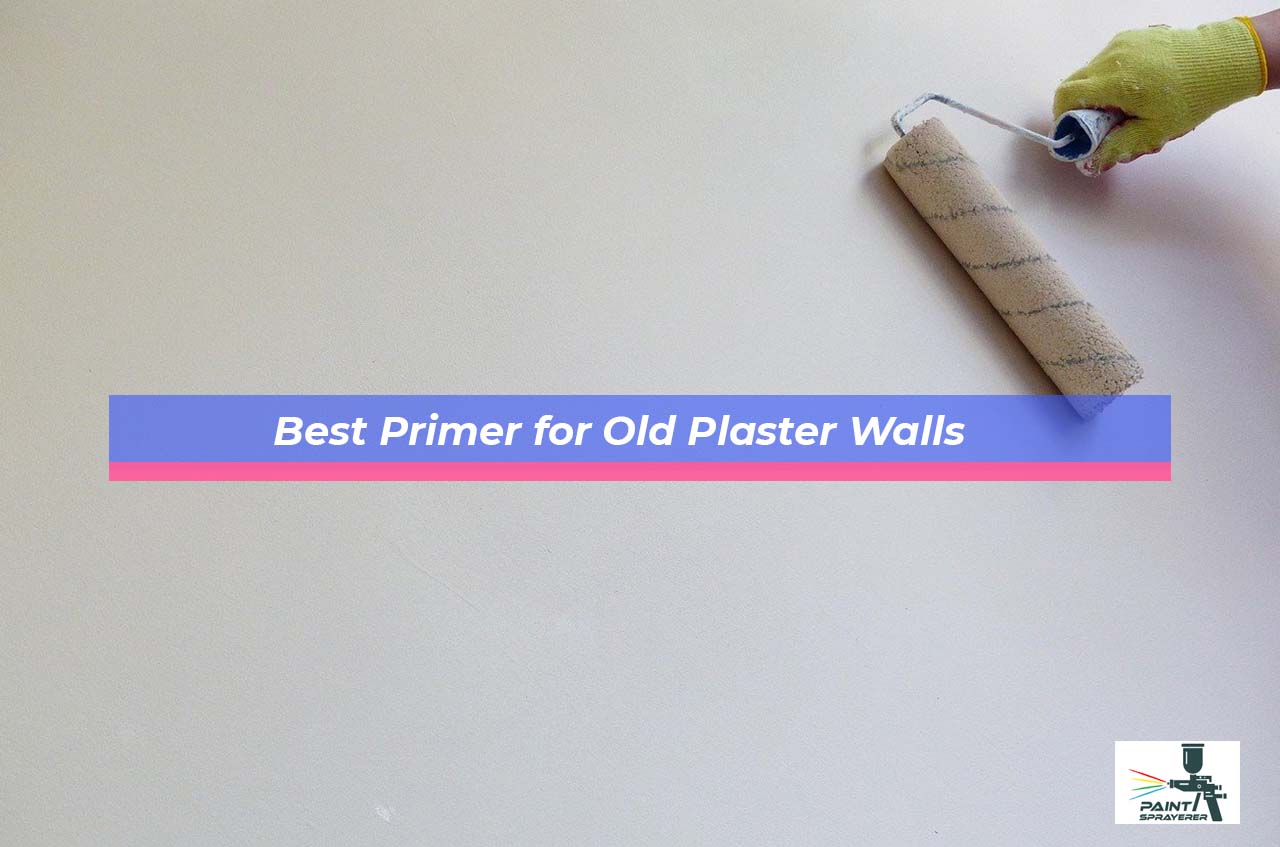
The fixing of an old wall (or for more than one wall) is a pre-painting process. It is of fundamental importance to perform a good fixation. It will help to have a very smooth effect of the finishes that will be applied at a later time.
But finding the best primer for old plaster walls is not easy. There is a wide range of products on the market. That's why we did thorough research and brought you the complete list.
Why not give it a go!
Table of Contents
What Is the Primer For?
The primer, also called fixative, clinging, or insulating is a building product that serves as a base for painting.
Composed of low-odor acrylic resins, it is a transparent, colorless, and non-flammable product. It is not harmful to the environment or to the people who use it.
What is the primer for plaster for? Its purpose is to reduce and uniform the absorption of the paint. It facilitates the application of paint, improving the final result. It, therefore, allows us to have compact and well-insulated surfaces on which to proceed with painting.










Best Primer for Old Plaster Walls: Best 5 Primers
KILZ Premium High-Hide Stain Blocking Interior/Exterior Latex Primer/Sealer
Overview
We would like to start our review of the best primer for old plaster walls with this KILZ Premium High-Hide Stain Blocking primer.
Do you want to have an excellent smoothing look in your old plastered walls? If you wish to, then the KILZ Premium High-Hide Stain Blocking primer is the best option.
This stain-blocking primer has a water-based formula. It hides the stain of your old plaster walls and makes it prepared for painting. So, you can use it without any hesitation.
It protects your wall from mildew and mold condition. It blocks porous surfaces, which will create a smooth finish of your old plaster wall. Besides, its high hiding formula will give you a new look at your old wall.
To cover approximately 300-400 square feet, you will need 1-gallon can of KILZ Premium sealer.
Pros
Cons
Rust-Oleum 276087 Mold Killing Zinsser Primer Quart
Overview
Are you worried about your mold affected old wall? Then, Rust-Oleum 276087 Mold Killing Primer Quart could be your first choice.
This Rust-Oleum 276087 Mold Killing Primer Quart is a water-based primer. It can kill the typical mold, fungus, moss, bacteria of your old surface of the wall.
EPA registered antimicrobial agents are used to formulating Rust-Oleum 276087 Mold Killing Primer. It enables us to stop further growth of these molds, mildew, fungus, and other bacterial organisms on the surface. You can use it directly over them.
It additionally fills in as a paint preliminary. So, you get two advantageous items in one, sparing you both time and cash on your next DIY home improvement venture. This primer works excellent with any interior and exterior application of the surface.
1 Quart of Rust-Oleum 276087 Primer covers 160 square feet, which dries in only 30 minutes.
Pros
Cons
Magnetic Receptive Wall Paint/Dark Black Primer
Overview
Next, in our best primer reviews, we have Magnetic Receptive Wall Paint/Dark Black Primer.
The best feature of this Magnetic Receptive Wall Paint/Dark Black Primer is the ability to change a regular wall into a magnetic board. To give a great look in your old wall, Magnetic Receptive Wall Paint/Dark Black Primer suits most.
Before going to paint your wall with your chosen color, you have to wait 24 hours for drying up the paint primer. You will be stunned to see, Guess for what? Well, there's a secret behind your magnetic receptive painted wall.
Per quart covers sufficiently around 20 square feet. If you want the best outcomes from Magnetic Receptive Wall Paint/Dark Black Primer, you should apply at least two heavy coats. If you need an expanded holding power, then you can increase your coating number.
Pros
Cons
Rust-Oleum Corporation 260925 Triple Thick Primer
Overview
If you are facing problems like peeling, weathered surfaces in your old plaster walls, then Rust-Oleum Corporation 260925 Triple Thick Primer is there to help you solve your problem.
It's a water-based binding primer which helps you to hide the peeling and weathered surfaces of your wall and makes the finishing smoother. For top coating, this primer-sealer for old walls can be done with latex or any alkyd paint. Rust-Oleum Corporation 260925 Triple Thick Primer will give you a super smooth white finish.
Rust-Oleum Zinsser Peel Stop Triple-Thick Primer is not only applicable for interior but also for the exterior. Its excellency for flexibility is just outstanding.
The performance of this sealer is high, and it's also a fast-drying primer, making it more accessible.
Pros
Cons
Roman 012401 PRO-880 Ultra Clear Adhesive
Overview
We end our best primer products review list with this Roman 012401 PRO-880 Ultra Clear Adhesive. This primer will make your old plaster wall into a new one by fixing your preferred wallpaper, which looks exceptionally fabulous.
Roman 012401 PRO-880 Ultra Clear Adhesive is a premium clear quality wallpaper adhesive with a combination of wet-tack and broadened open time features to adhere to. It's generally used for the wallcovering installations for the construction venture on commercial purposes. When it is used on a bare wall, it shows strippable fabric-backed wallcovering adhesive ability.
Per gallon of Roman 012401 PRO-880 Ultra Clear Adhesive covers 330 square feet area approximately.
Pros
Cons
When to Use It: Make the Color of Your Walls More Uniform
Before starting to paint for plaster walls, the primer for old wall painting must be applied as a product. It should be used on new smoothed and never painted walls, or on old walls with plastered parts. It should not be applied in the case of repainting plaster walls unless the walls have undergone grouting.
Thanks to its use, the walls absorb less paint (reducing consumption), and the color's application is more defined.
The fixing makes the color more uniform and guarantees an aesthetically, more tangible final result. The painting is, therefore, homogeneous and intense right from the first coat. The porosity of the walls is also eliminated, and any imperfections are uniformed.
Besides, the result is long-lasting because the paint fixes very well to the base. There is a risk of less detachment of the paint.
How to Apply the Primer Before Painting?
Before using it, the primer must be diluted with water. For the correct quantities, consult the instructions contained in the insulation leaflet. In any case, it is always better to abound with water, in order not to risk applying too thick a product that could damage the surfaces.
Before applying the primer, the walls must be cleaned, dusted, and sanded. Then use the introduction choosing between the types of brushes (brush or roller). The veil of insulation must be thin and free of dripping; therefore, the brushes must be dipped in the product.
Depending on the absorption, you can decide whether or not to make a second coat.
Pay close attention to how you apply the primer: if you spread it badly, the brush will tend to slip, and the paint will not take root.
Before painting, wait until the walls are completely dry. If the house is new or the plaster has been recently redone, it is necessary to wait for the humidity of the walls to evaporate before applying the final tint thoroughly.
Best Primer for Old Plaster Walls: What Are the Advantages?
Serves as base
It is the most well-known advantage of primers, the one that any professional would mention first. Indeed, a primer serves as a bridge between materials; that is, it allows the paint to adhere and prevents it from peeling off easily.
Regularize the Surface
It is common, especially when preparing plaster walls for painting that we find that we must cover different materials. Take, for example, a plaster wall where old paint has leaped here and there, and where we have also repaired a crack. In this case, the paint we have chosen must cover three materials: plaster, paint, and plaster, since each element has a different composition and, therefore, a different absorption capacity. If we do not fix the surface previously, we will find that the paint can adopt different shades depending on the material on which it has been applied.
If, on the contrary, we apply the correct primer before starting to paint, we will be able to regularize the surface. In other words, the primer will equalize the entire wall's absorption capacity, avoiding the disparity of tones.
Seal the Pores
A primer is chosen according to the material to be applied the ability to seal the surface pores. In this way, the material's absorption capacity is considerably reduced. It prevents the wall from absorbing the paint. In other words, if we fix the surface before painting it, we will be saving a lot of money and energy.
Know the Surface
One of the advantages of primers is that, before they harden, they penetrate the materials they are applied to. This penetration capacity varies greatly depending on the type of primer. In any case, the same effect is always achieved to a greater or lesser extent: that of consolidating and hardening the surface.
This is especially important on walls and ceilings of plaster, plasterboard, temples, etc. or walls with specific problems, such as in dead plaster cases.
Protect Materials
By making them less porous, primers also serve to protect surfaces. That is why they are especially important in the case of materials that are going to be exposed to the elements.
Conclusion:
In conclusion, rather than being recommended, a good primer is essential if we want an excellent finish and, above all, a lasting result. Now that you know its advantages, all you have to do is choose the right primer. Check out our list and find it for yourself.
Affiliate Disclosure: As an Amazon Associate, we may earn commissions from qualifying purchases from Amazon.com.





